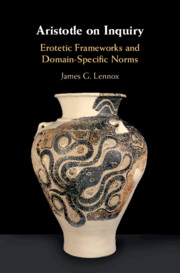Book contents
- Aristotle on Inquiry
- Aristotle on Inquiry
- Copyright page
- Dedication
- Contents
- Figures
- Preface
- Abbreviations
- Introduction
- Part I Erotetic Frameworks and Domain-Specific Norms
- Part II Norms of Natural Inquiry
- Chapter 5 The Methodos of Nature
- Chapter 6 Shaping the Methodos of Animals
- Chapter 7 The Soul
- Chapter 8 The Order of Inquiry i
- Chapter 9 The Order of Inquiry ii
- Chapter 10 Aristotle on Respiration
- Bibliography
- Index Locorum
- General Index
Chapter 8 - The Order of Inquiry i
Right and Left in De caelo and De incessu animalium
from Part II - Norms of Natural Inquiry
Published online by Cambridge University Press: 07 May 2021
- Aristotle on Inquiry
- Aristotle on Inquiry
- Copyright page
- Dedication
- Contents
- Figures
- Preface
- Abbreviations
- Introduction
- Part I Erotetic Frameworks and Domain-Specific Norms
- Part II Norms of Natural Inquiry
- Chapter 5 The Methodos of Nature
- Chapter 6 Shaping the Methodos of Animals
- Chapter 7 The Soul
- Chapter 8 The Order of Inquiry i
- Chapter 9 The Order of Inquiry ii
- Chapter 10 Aristotle on Respiration
- Bibliography
- Index Locorum
- General Index
Summary
Chapter Summary. In this chapter and the next I explore the ways in which Aristotle uses the results of one natural inquiry as starting points for inquiry in another area. This is a practice in which Aristotle routinely indulges, and yet there is, at least prima facie, a problem with him doing so, given his views about how we arrive at first principles and the propriety of those principles to specific domains. In APo. i.7–13, he allows that geometric and arithmetic premises can be used in a range of fields of inquiry he refers to as ‘subalternate’ branches of mathematics, which he elsewhere describes as ‘the more natural of the mathematical sciences’ (i.e., optics, astronomy, mechanics, and harmonics). However, whether and, if so, how this practice might apply within the science of nature is never explicitly addressed. In this chapter, I address this question by exploring the dependence of Aristotle’s discussion of the application of the concepts ‘right’ and ‘left’ to the motions of the heavens on his discussion of directional dimensions in De incessu animalium.
- Type
- Chapter
- Information
- Aristotle on InquiryErotetic Frameworks and Domain-Specific Norms, pp. 200 - 226Publisher: Cambridge University PressPrint publication year: 2021



